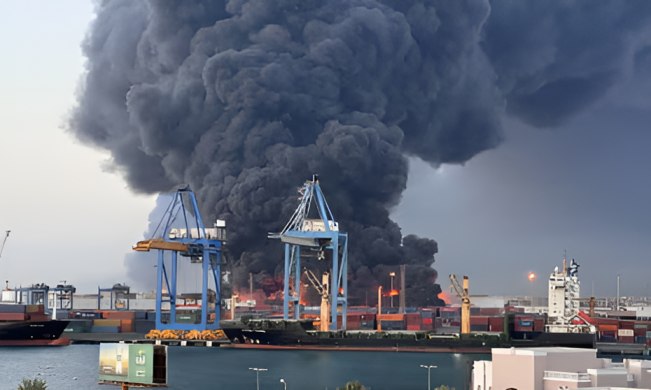Drone strikes in Port Sudan intensify conflict, target key infrastructure

This new wave of attacks marks a significant escalation in the two-year-old conflict.
Explosions and fires have rocked Sudan's wartime capital, Port Sudan, in the latest escalation of the country's ongoing civil war.
Witnesses reported a series of drone strikes, with the paramilitary Rapid Support Forces (RSF) targeting critical infrastructure, including the city’s container terminal, fuel depots, and key facilities crucial for humanitarian aid.
This new wave of attacks marks a significant escalation in the two-year-old conflict, which has already caused widespread destruction across the nation.
The drone strikes, which intensified on Tuesday, have caused extensive damage, particularly to the fuel storage facilities near the port and the airport, leading to massive plumes of black smoke.
The RSF’s attack on the electricity substation has also resulted in a power outage across the city, further straining the already fragile humanitarian situation.
These strikes come just days after the RSF began targeting the city’s strategic infrastructure on Sunday, including vital routes used for aid deliveries.
The destruction of fuel facilities and damage to the port and airport threaten to exacerbate Sudan's worsening humanitarian crisis, which the UN has called the worst in the world.
The airstrikes have disrupted aid operations, cutting off key delivery channels for food and medical supplies while also impacting essential services like power and cooking gas.
While Port Sudan had remained relatively calm compared to other parts of Sudan since the conflict began in April 2023, the recent attacks signal a shift in the war.
The Red Sea city, which had become the base for the army-aligned government following the RSF's early successes in Khartoum, now faces the prospect of being drawn deeper into the conflict.
Hundreds of thousands of displaced people have also sought refuge there, making it a critical hub for aid operations and the headquarters of various UN agencies and diplomats.
The sudden escalation of drone strikes on Port Sudan, especially targeting the army's main stronghold in eastern Sudan, follows a series of earlier confrontations in which the army had managed to push the RSF back across much of central Sudan.
Despite these gains, the RSF's shift towards using drones in attacks has made it more difficult for the army to maintain control.
As military sources continue to accuse the RSF of escalating violence, the paramilitary group has denied responsibility for the strikes and instead accused the army of committing war crimes.
In a statement late Tuesday, the RSF condemned what it called targeted attacks on civilian infrastructure, while reaffirming its position that the Sudanese army is backed by foreign powers, including Iran.
The RSF has also stressed its commitment to preventing such attacks from continuing, signaling that the conflict is likely to persist without a clear resolution in sight.
The international community has expressed growing concern over the escalation in Port Sudan.
Neighboring countries such as Egypt and Saudi Arabia have condemned the attacks, while the United Nations continues to call for urgent measures to address the humanitarian impact.
The conflict, which initially erupted due to a dispute over Sudan's transition to civilian rule, has left over 12 million people displaced, with nearly half the population now facing acute hunger.
As the fighting continues, the RSF has increasingly targeted vital infrastructure in army-controlled areas, including power stations, while the Sudanese army continues its airstrikes on RSF strongholds in Darfur.
